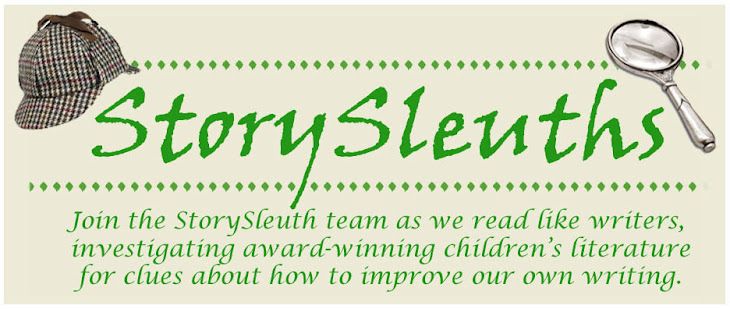Dear Meg and Allyson,
Thanks, Meg, for kicking off our discussion of Where the Mountain Meets the Moon. What a treat to hear a storyteller’s perspective of the oral storytelling nature of language this book!
In fact, the narrative voice flows so smoothly, that I felt immediately swept up in the unfolding of events. As I went back to the beginning of the book and looked for examples of writing craft to discuss, I realized that author Grace Lin establishes motivation and desire in very subtle ways.
What does the character want?
Ah, the question every writing teacher and editor asks. What does the character want? What motivates the character? Why does she do what she does? Why does it matter? What’s at stake? And why do we readers care?
Donald Maass writes about personal stakes in his book Writing the Breakout Novel Workbook:
Personal stakes are more than just what a hero wants to do. They illustrate why. Why this goal and the action that must be performed matters in a profound and personal sense. The more it matters to your hero, the more it will matter to your readers, too. (p. 40)
Lin uses the first chapters of Where the Mountain Meets the Moon to establish Minli’s personal stakes.
Problem
On the very first page of the book, we learn that the land where Minli lives is “hard and poor.” Because the land is so barren, Minli, her family, and the rest of the village, too, are also poor. This poverty is Minli’s way of life, however. She accepts it.
Minli’s mother, however, bemoans their poverty. She sighs
a great deal, an impatient noise usually accompanied with a frown at their rough clothes, rundown house, or meager food. Minli could not remember a time when Ma did not sigh (pp. 2-3).
At the end of the chapter, Ma exclaims, “What poor fortune we have!”
What makes Minli different, we learn, are the stories her father tells. These stories keep her spirit alive. She doesn’t see them the way Ma does, as useless. In fact, the stories stimulate Minli’s curiosity about the world. “So how will Fruitless Mountain ever grow green again?” she asks her father after the first story.
Minli’s belief in the stories also creates a sense of hope. Unlike her mother, she believes the stories are true. She believes, in a naïve, child-like way, that change can happen.
The problem then is not impossible. Lin makes sure to plant a seed of hope.
Worry
Although Minli is an optimistic character, the hard work she performs impacts her.
When the hot sun burned overhead, Minli’s knees shook from weariness. She hated the feeling of thick, soggy mud on her hands and face; and many times she wanted to stop in irritation and exhaustion (p. 11).
She returns home from working in the field one evening and notices her reflection in the basin of water she uses to wash up. “As she looked at herself reflected in the dark water, she saw Ma’s frown on her face” (p. 12). She doesn’t just see Ma’s frown, though. She also takes on Ma’s thinking:
Ma is right, Minli thought. What poor fortune we have. Every day, Ba and Ma work and work and we still have nothing. I wish I could change our fortune (p. 12).
Lin doesn’t reveal Minli’s age, but I assume she’s a pre-teen. She’s old enough to undertake a journey but certainly not yet a young woman. Minli’s reaction to noticing the similarity between her expression and her mother’s feels very appropriate for this pre-teen age. She notices the similarity, and she doesn’t like it. She wants to change their fortune because she worries she’ll end up like Ma, sighing and complaining all the time.
Desire
The combination of the problem (poverty) and Minli’s worry (that she’ll become her mother) ignite to fuel a desire (to change their fortune). Minli makes a rash decision to purchase a goldfish using one of her two coins. The purchase causes her parents to fight. Minli watches as her father sacrifices some of his precious rice to feed the fish. She realizes her mistake. She releases the fish into the river.
Minli watched it and sighed. As the sound faded into the night, Minli realized it was an echo of her mother’s impatient, frustrated noise. “Ma will never stop sighing unless our fortune changes. But how will it ever change?” Minli asked ruefully. “I guess it’s just another question for the Old Man of the Moon. Too bad no one knows how to get to Never-Ending Mountain to ask him anything." (pp. 27-28)
At this point, Minli’s desire is stronger. She understands her mother’s despair even as she dislikes it. She notices once again that her actions reflect her mother’s. But now she doubts that she or anyone else can do anything to change their fortune.
The promise of the novel
At this point, we readers are hooked. We don’t want Minli to become disillusioned and pessimistic. We don’t want her to turn out like her mother any more than she does. We want her to find the Old Man of the Moon. We want her to change her fortune.
You could say that Minli’s personal stakes transform at this point to our expectations for the novel. We want what Minli wants. Lin has accomplished what Maass described in the quotation above: “The more it matters to your hero, the more it will matter to your readers, too.”
StorySleuths Tip # 69: Use problems and worries to establish the protagonist’s motivation and desire.





